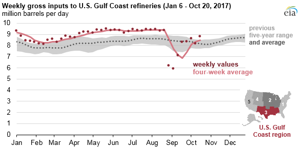Gulf Coast refinery runs approaching pre-hurricane levels
For the week ending Oct. 20, gross inputs to petroleum refineries in the US Gulf Coast averaged 8.8 MMbpd, or about 324,000 bpd higher than the previous five-year range for mid-October, based on data in EIA’s Weekly Petroleum Status Report (WPSR). Gross inputs, also referred to as refinery runs, in the Gulf Coast had been higher than the five-year range for much of 2017 until Hurricane Harvey made landfall in the Houston, Texas, area on August 25.
A little more than half of all US refinery capacity is located in the US Gulf Coast region (defined as Petroleum Administration for Defense District 3). Texas, where Harvey made landfall, represents 31% of all US refinery capacity according to data from January 2017. Gulf Coast refineries supply petroleum products to domestic markets in the Gulf Coast, East Coast, and Midwest, as well as to international markets.
Hurricane Harvey’s most significant effect on petroleum markets was the curtailment of some refinery operations in Texas. Refinery operations rely on a supply of crude oil and feedstocks, electricity, workforce availability and safe working conditions, and outlets for production. As a result of Hurricane Harvey, many refineries in the region either reduced runs or temporarily shut down.
For the week ending Sept. 1, the first WPSR data point after Harvey’s landfall, gross inputs to refineries in the Gulf Coast fell 3.2 MMbpd, or 34%, from the previous week. For the week ending Sept. 8, Gulf Coast gross inputs to refineries fell by another 263,000 bpd to 5.9 MMbpd, the lowest weekly value since Hurricanes Gustav and Ike disrupted refinery operations in September 2008.
After several weeks of increasing refinery runs following Hurricane Harvey in late September and early October 2017, Gulf Coast refinery runs fell again during the week ending Oct. 13 because of additional disruptions caused by Hurricane Nate. Overall, the magnitude and duration of Hurricane Harvey’s impact on Gulf Coast refinery runs has been similar to what happened following Hurricanes Katrina in 2005 and Gustav and Ike in 2008.







Comments